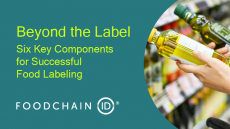Organic stakeholders test pilot to root out fraud
The three-month pilot program will take to the next level a comprehensive best-practices guide created over the past year by the Organic Trade Association’s Global Organic Supply Chain Integrity Task Force in response to the unwelcome discovery that some corn and soy from Eastern Europe was fraudulently labeled as organic.
“The organic industry has grown to $50 billion, so we are hugely successful, and with success comes this phenomenon where people want to get a piece of the pie,” but they are not all willing to do the work, Gwendolyn Wyard, vice president of regulatory & technical affairs for OTA, told FoodNavigator-USA. Unfortunately, she added, “fraud is part of every sector, so it is not new, but it certainly is new to organic.”
She explained the potential impact of fraud, if left unchecked, could be catastrophic to the organic industry.
“If there is one thing that is going to break consumer trust, it is hearing that the organic seal doesn’t actually represent something that is organic. It is pretty straightforward. So, I think, it just became aware to everybody that we needed to take action, and that everybody has a role in preventing organic fraud,” she said.
For its part, OTA created a 48 member task force to create a best practices guide that would help organic businesses detect, manage and mitigate fraud in the organic supply chain. But rather than simply creating a white paper to be downloaded from a website, the trade group decided to make a living, breathing fraud prevention program that would become a fundamental part of the annual organic and inspection program.
The practices are “laser focused on supply chain,” and making it as short and transparent as possible, and include an entire section on mitigation strategies as well as a requirement – and step-by-step guide – to help stakeholders report suspected fraud to the National Organic Program, Wyard said.
But before requiring the best practices as a term of the annual organic inspection and certification, OTA wanted to ensure that the program works for different players across the supply chain and in different commodity sectors – hence the three-month pilot project.
Other efforts to root out fraud in organic
The pilot project, which will run for three months from June to September, is only one piece of a much larger effort to root out fraud and reinforce the integrity of the supply chain.
Other components include a request in the Farm Bill to reauthorize funding for the National Organic Program so that it can keep pace with the market, including a request for a $5 million one-time upgrade to improve technology systems related to organic certification and tracking.
The bill also seeks to close existing loopholes in the certification and inspection process, such as requiring brokers, importers and online auctions that handle organic products to become certified, Wyard said.
It also would increase the authority of NOP over certifying agents and their global operations to require full accreditation audits of satellite offices annually and require USDA to provide Congress with an annual audit report of domestic and international investigations and actions.
Noting that these are only a few examples of how industry and government are working together to crackdown on fraud, Wyard said that when taken together, these actions send a message to criminals that the organic space is not a place for them play or stay.





















